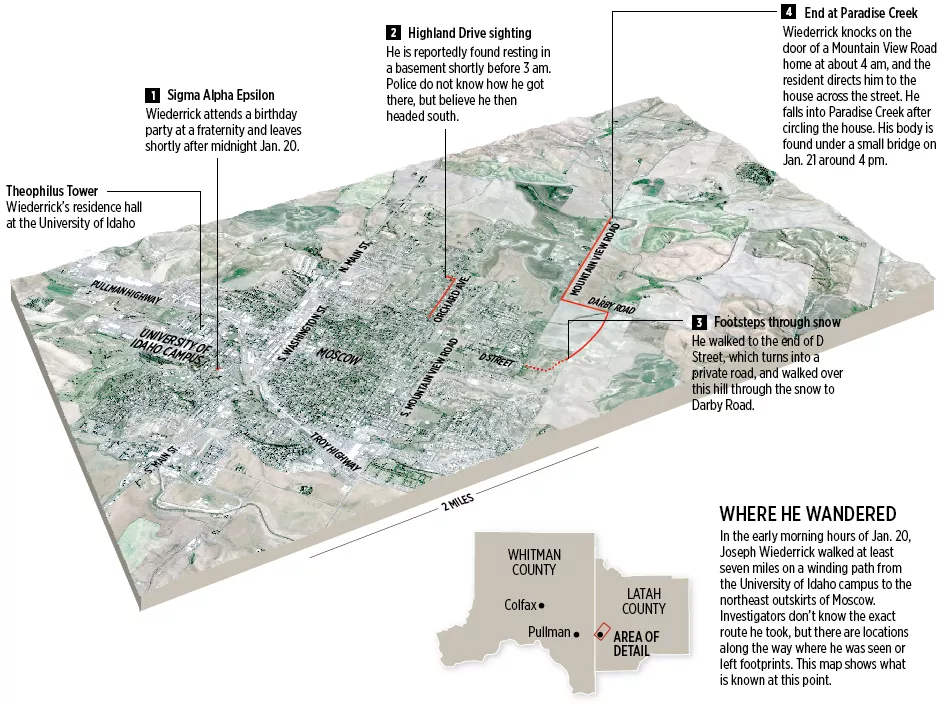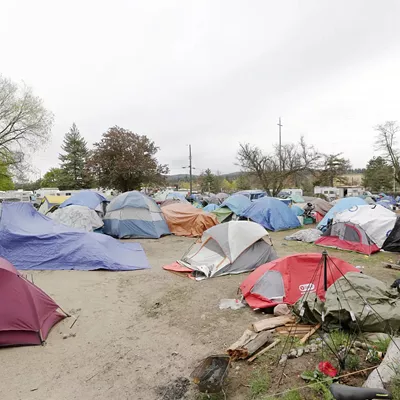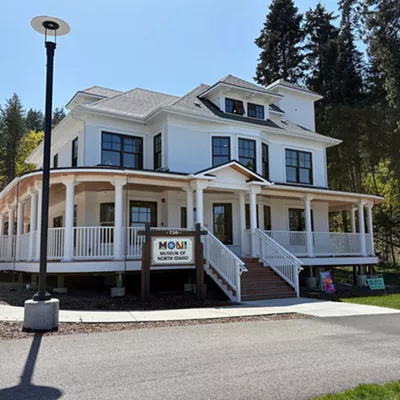Near the end, Joseph Wiederrick’s footprints cut aimless circles in the snow-covered fields. A popular University of Idaho freshman with wavy blond hair, he had walked all night, straying several miles from the heart of Moscow, Idaho, out into the open hills beyond. With a starry sky against the distant mountains, he wandered the endless stubblefields until cold and exhaustion caught up with him.
Alone, he eventually came to rest beneath a small bridge, leaving a bright life unfinished and a trail of questions.
In the days since, local authorities and loved ones have struggled to understand what drove him out into the unknown. Witnesses say he was drinking, but others thought him lucid. Investigators continue to reconstruct his path, piecing together cell phone calls, brief encounters and his final footsteps.
“It’s been a tragic event,” Moscow Police Chief David Duke says. “It’s shocked the community.”
On Jan. 20, Wiederrick slipped out of an on-campus party shortly after midnight. He likely joined hundreds of other students on the streets of the small college town, stumbling into the frigid morning for a short walk home. But while others staggered back to the warmth of their dorm rooms, he turned north and headed away from campus.
No one knows why.
Investigators say Wiederrick called two friends and stopped by at least two random homes, but never really asked for help. All night he drifted through the city of 23,800 people. He told others he was heading home, but never returned.
“It’s just a senseless tragedy,” he says. “He could have been saved at so many different times along the way.”
Born and raised in Hailey, Idaho, Wiederrick grew up in the rugged backcountry of the Sun Valley region, east of Boise. His father says the 18-year-old enjoyed mountain biking, hiking, skiing and target shooting. He made friends easily.
“He was just a great kid,” his father says. “He had a tremendous amount of friends. He was just very well liked and is very well missed.”
Wiederrick, known as Joe, started at the University of Idaho in the fall. His father says he planned to study architecture. Even as a young boy, he had sketched out floor plans for buildings, giving structure to his imagination.
“He’s always been a good artist,” he says. “He was way more talented than I ever was.”
When many of his friends headed to the University of Idaho, Wiederrick followed along, his father says. He shared a dorm room with a childhood friend in the Theophilus Tower residence hall on campus.
Wiederrick had barely started his second semester when another friend from Hailey invited him to a birthday party at the Sigma Alpha Epsilon fraternity. The large brick fraternity house sits on Deakin Avenue near the eastern edge of campus, just a half-mile from Theophilus Tower.
Police Chief Duke says witnesses estimate about 120 students attended the party that night. Students reported Wiederrick was seen drinking, but they could not say how much. Nobody remembers seeing him walk out, but investigators believe he left shortly after midnight.
Wearing a blue winter coat, a backpack and lightweight Vans shoes, Wiederrick disappeared into the night. His roommate returned to their dorm room around 2:30 am, Duke says, and no one was there. Wiederrick continued to wander the streets.
“He was disoriented,” Duke says, “and he apparently was lost.”
At about 3 am, Wiederrick called his roommate. The roommate tells authorities Wiederrick did not say where he was or hint at any distress. Wiederrick just said he was on his way home. The roommate went to sleep.
Standing alongside a large black-and-white map of Moscow, Duke says investigators do not know exactly where Wiederrick went after leaving the party. The chief points to a secluded residential neighborhood in the northeast part of town where Wiederrick showed up two and a half hours later.
A woman living along the 1100 block of Highland Drive — about two and a half miles from campus — tells authorities she heard a door open just before 3 am. When she went to check, she found Wiederrick in her basement.
“He had entered a house through an unlocked door and laid down on the floor,” Duke says. “The homeowner came down thinking it was her children and saw him laying there. … He said his name was Joe.”
When the woman asked why he was there, Wiederrick reportedly said he thought he was still at the fraternity house. Duke says the woman saw Wiederrick was obviously confused, but he otherwise seemed fine. She asked if she could call anyone for him.
“He said no and apologized,” Duke says. “[Then he] started walking out the door and apologized again.”
Investigators believe this is when Wiederrick called his roommate as he walked south along Orchard Avenue back into the city. But instead of heading toward campus, Duke says, he appears to have turned east down D Street.
D Street would carry Wiederrick out past several blocks of single-family homes, past schools and playgrounds, past leafless trees and chain-link fences. A yellow “Dead End” sign stands at the far east end of the street, just shy of the city limits.
Investigators say Wiederrick appears to have walked past the sign and out beyond the edge of the city, down to the end of the road where it runs into a steep pasture. Weather records show the temperature had dropped throughout the morning, nearing 24 degrees as Wiederrick struck out into the field, stomping through several inches of snow.
As the body’s core temperature drops, people often become confused and lose coordination. Medical studies show hypothermia starts with shivering and mumbling. Decision-making becomes muddled. Fatigue sets in. Hypothermia is known to cause apathy or lack of concern about perilous conditions.
“A person with hypothermia usually isn’t aware of his or her condition, because the symptoms often begin gradually and because the confused thinking associated with hypothermia prevents self-awareness,” a Mayo Clinic report states.
Alcohol can intensify the effects of hypothermia. Studies show alcohol causes blood vessels to expand, speeding up heat loss through the skin. Drinking also impairs judgment, further undermining decision-making.
Duke says deputies tracked Wiederrick’s footprints up and over a snowy hill as he crossed through several wide fields on the outskirts of Moscow. He continued east through ankle-deep snow, away from the city.
“He walked quite a distance in snow,” Duke says. “If you consider that all he had were Vans [shoes] on, then they were probably frozen [early] into his walk because he covered several miles in anywhere from 4 to 6 inches of snow.”
Eventually, Wiederrick ran into Darby Road, northeast of the city, and appears to have returned to the pavement. Investigators found his footprints leading to a nearby house, but he either did not knock or no one heard him.
Signs indicate Wiederrick turned back west toward town. He followed Darby Road until it ends in a T-intersection with Mountain View Road. At this point, Wiederrick had wandered for nearly four hours. The temperature sat near 21 degrees. His shoes were frozen or packed with snow. The cold was likely taking hold of him.
As Wiederrick came to the intersection, he faced two distinct directions. To the south, he should have been able to see the city lights of Moscow. To the north, nothing but empty fields and the jagged outline of black mountains.
He turned north.
Paradise Creek, a slow, twisting stream, flows from its headwaters on Moscow Mountain down through the low, rolling pastureland outside the city. Little more than a weed-choked irrigation ditch in spots, the creek winds back and forth, skirting Mountain View Road, crossing the road under a small bridge before continuing to the Snake River.
Wiederrick appears to have followed Mountain View Road for more than a mile before breaking off to approach a farmhouse at about 4 am. Investigators say his tracks indicate he walked around the home, trying to get in or get someone’s attention.
A woman answered the door and asked Wiederrick if he was OK, Duke says. Since the woman was alone, she asked him to seek help from the family across the street. When contacted later by a reporter, the woman confirms the encounter, but says the details are too difficult to discuss.
She says she watched Wiederrick head across the street toward the neighbor’s house and returned to bed.
Allison Ryan, who lives across the street, says Wiederrick never came to her door. His tracks circle up around the back of the house, but never approach the porch. The family dog barked, she says, but they did not know anyone might be in need of help.
“We never heard him,” Ryan says. “That’s what I’m devastated about. He would have been welcome.”
Investigators say his footprints cross the field behind their house and jump a fence. He then crossed the frozen surface of Paradise Creek as he curved back toward the road.
“The trail around the house he walked in circles,” Duke says. “They weren’t straight tracks.”
As he tried to cross the creek a second time, he slipped and fell, Duke says. He appears to have hit his head on the ice. Snow and water soaked his clothes. He pulled himself up under the small bridge nearby, seeking shelter below the road.
Investigators believe Wiederrick tried to call a second friend at about 4:30 am. The friend did not hear the phone, and Wiederrick did not leave a message. Tired and cold, he lay down.
When Wiederrick’s roommate woke up alone Sunday afternoon, he quickly reported his childhood friend missing. Police launched a search that same afternoon. Officers and deputies scoured campus. News reports broadcasted photos of the wavy-haired blond teen.
Authorities found Wiederrick’s footprints in the snow late Sunday and followed them to Darby Road. Early the next morning, the Latah County Search and Rescue Council arrived with trackers, horse-mounted searchers and a rescue helicopter out of Fairchild Air Force Base.
Noticing the commotion, Ryan and her son decided to check their property, she says. Her son soon found Wiederrick under the bridge just as searchers closed in on the location at about 4 pm on Jan. 21.
“It’s so sad,” she says. “We’re grieving. We’re just devastated.”
The Latah County Coroner later conducted an autopsy, concluding hypothermia contributed to Wiederrick’s death. Duke says toxicology reports will take another two or three weeks.
Wiederrick’s parents rushed to Moscow during the search. They watched with hope as officers, horsemen and helicopters combed the fields. Afterward, they stayed to collect his things, questioning how their son’s life slipped through so many fingers.
“He’d been in contact with other people that night and I don’t think they did the right thing,” Bob Wiederrick says later. “That’s been one of the distressing things for us. People need to watch out for each other.”
The University of Idaho issued a statement of condolence. The national office of the Sigma Alpha Epsilon fraternity pledged to look into the circumstances leading to Wiederrick’s disappearance.
His family takes some solace in the quick resolution, a small measure of closure. They hold tight to the memory of their outgoing son and brother, a dreamer of skyscrapers.
“We have no regrets,” the father says. “He knew he was loved and he had a good life.”
He pauses.
“Even though it was short.”
In the fields along Mountain View Road, footprints still stitch the snow. The banks of Paradise Creek lie broken and trampled by searchers. But a few fresh tracks have appeared by the roadside, leaving flowers at the bridge over the frozen stream.
An occasional car passes with students headed to campus. This weekend many will drink and cheer and stagger home with the heady invincibility of youth. Paradise Creek will trickle on and the mountains will rise over the empty fields, ringing with a silence like an unfinished whisper.



















